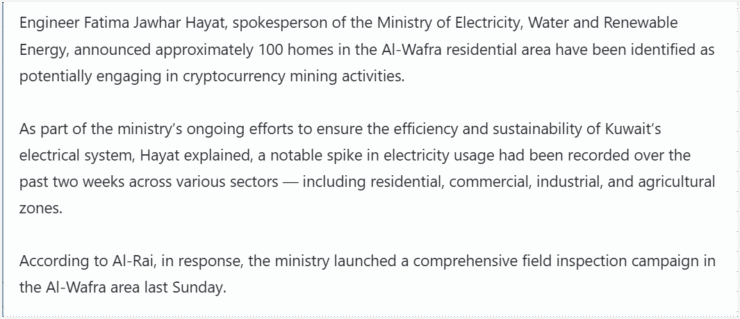Kuwait’s Ministry of Interior has sounded the alarm after uncovering more than 1,000 suspected cryptocurrency mining operations across the country, shedding light on a growing wave of underground activity in violation of the national crypto ban. The discovery stemmed from electricity consumption data that revealed widespread anomalies—signs pointing to unlicensed mining rigs operating at scale.
Cryptocurrency mining has been prohibited in Kuwait since July 2023, following a sweeping directive from the Capital Markets Authority banning all digital asset-related activities, including trading and token transfers. Despite this, enforcement has proven difficult, as Kuwait’s heavily subsidized electricity continues to attract would-be miners looking to capitalize on low overhead costs.

Authorities describe the mining operations as an “unauthorized practice” that not only violates national law but also puts immense pressure on the country’s energy infrastructure. Officials warn of power grid overloads, service disruptions, and increased fire risks, framing illegal mining as a growing public safety concern.
The latest warning comes as part of a broader government push to safeguard Kuwait’s energy systems and financial integrity amid rising crypto-related violations. For countries like Kuwait—where cheap power presents a tempting loophole for miners—the challenge lies in balancing national resources with enforcement against crypto exploitation.
Ministry Cites Public Safety Risks from Al-Wafra Mining Surge
According to officials, abnormal electricity usage patterns were detected in over 100 homes in the Al-Wafra region. These properties showed stable, high-volume power consumption around the clock—contrasting sharply with the typical fluctuations seen in residential usage.
Routine inspections revealed that some homes consumed over 100,000 kilowatt-hours in March alone—approximately 20 times the average monthly household use. These anomalies triggered further investigation, which uncovered unauthorized crypto mining rigs operating continuously.
Fatima Jawhar Hayat, spokesperson for the Ministry of Electricity, confirmed that the sustained energy spikes were “directly attributable to mining activity.” She reiterated the nationwide ban and urged individuals engaged in illegal mining to cease operations immediately or face legal consequences.
Kuwait Vows Vigilance as Crypto Mining Persists Post-Ban
The fate of the residents in the 100 Al-Wafra homes remains unclear, but Kuwaiti officials have vowed to continue real-time surveillance of electricity patterns nationwide to detect and deter further mining operations.
Before the 2023 ban, Kuwait accounted for a minor 0.05% share of the global Bitcoin hashrate, according to the Cambridge Bitcoin Electricity Consumption Index. However, the country’s ultra-low electricity rates made it an attractive location for miners seeking to maximize profits through low-cost energy access.
Since outlawing all crypto-related activities, including mining and trading, authorities have struggled to fully suppress public engagement with digital assets. While there is no comprehensive data on crypto ownership in Kuwait post-ban, anecdotal reports suggest local trading activity continues under the radar.
Quick Facts
- Over 1,000 illegal crypto mining sites have been flagged across Kuwait, sparking government warnings and investigations.
- Crypto mining and trading have been banned in the country since July 2023.
- Anomalous power usage in Al-Wafra helped uncover active, unlicensed mining operations.
- The crackdown is aimed at protecting Kuwait’s energy infrastructure and enforcing financial laws amid ongoing crypto-related risks.





